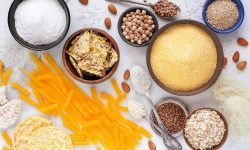Favourite Gluten-Free Items Available at Spud May National Celiac Awareness Month, but every day Spud…
Have you ever wondered why everyone tells you to replenish your body with electrolytes, especially after exercising? This is because electrolytes are crucial in both keeping the body hydrated, as well as nerve and muscle functioning. Simply put, without electrolytes, your nervous system would not work properly.

What are electrolytes?
Electrolytes are the smallest of substances that allow cells to function. These substances are essentially minerals that carry an electric charge, and come in the form of sodium, potassium, magnesium, chloride, calcium, and phosphorus. And many of these minerals are lost through sweating, particularly when we exercise, as well as through regular functions such as urination.
Not all electrolytes are created equal.
Of course, as you would’ve guessed, each type of electrolyte has its own function, and some are more crucial than others. Here are some of the most abundant electrolytes and why our body requires them.
1. Calcium
Calcium is the most abundant electrolyte in the human body. We often associate calcium with strong bones and healthy teeth, but calcium also aids the nervous system, muscle function, and heart health.
Good sources: dairy, eggs, collard greens, figs
2. Potassium
If you watch sports, you’d notice that athletes always seem to have a banana with them. This is because banana is high in one of the fundamental electrolytes: potassium. Potassium is essential for heart function, muscle contraction, and skeletal growth.
Good sources: coconut water, banana, beans, avocado
| GET YOUR COCONUT WATER DELIVERED! |
3. Magnesium
Magnesium is required by every organ in the human body. It helps maintain muscle and nerve function, and strengthen bones. It also works closely with potassium to help lower blood pressure.
Good sources: nuts, beans, leafy greens, whole grains
4. Sodium/Chloride
We’re always reminded not to consume too much sodium, but our body does require some amounts of it, as it helps with regulating blood pressure. While sodium chloride is basically table salt, it is still better to obtain sodium and chloride from food sources.
Good sources for sodium: celery, milk, beets
Good sources for chloride: seaweed, tomatoes, celery, olives
5. Phosphorus
Phosphorus has a similar role as calcium in that it assists with maintaining healthy bones and teeth. But it also helps prevent and repair any cell damage and converts carbohydrates and fats into energy. Most vegetables and fruits are very low in phosphorus, so if you’re a plant-based kind of eater, make sure you’re getting adequate phosphorus!
Good sources: meat, dairy, beans, nuts
Stay replenished and hydrated.
The lack of electrolytes can lead to various issues, including fatigue, insomnia, numbness, headaches, digestive issues, and irregular heart rate. So make sure you’re hydrated! Water is always a safe bet, but if available, opt for coconut water instead. Coconut water is a supreme source of electrolytes, as it offers all of calcium, phosphorus, sodium, magnesium, and potassium–its potassium content is even higher than that of banana.





